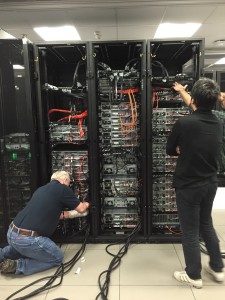Building an HPC Solution with Flexibility to Meet Future Needs

Washington University in St. Louis supports a large, diverse user community including researchers from disciplines not usually associated with HPC such as Economists and Radiologists.
The Objective:
“We needed a heterogeneous mix of hardware to support the wide variety of applications being run on our systems,” said Malcolm Tobias, Systems Manager and Technical Programmer for Washington University in St. Louis. “Like everyone else, we can never have enough fast storage.”
Washington University needed a high performance computing solution that would be scalable for future needs. Initially, the university envisioned an HPC cluster with 1,000 compute cores, but that plan was cost-prohibitive.
“We went back to the table and proposed the new Intel Haswell processors while other vendors were offering the previous generation,” said John Gannon, account executive at Advanced Clustering. “This gave us an edge in the end but initially it was a disadvantage as the new processors had no real field use at the time. Our team did extensive testing with the new processors and helped with a presentation that demonstrated the advantages of more cores with fewer nodes.”
The university also wanted a fast storage system of 100 terabytes. Working within the university’s limited budget for storage, Advanced Clustering recommended a Lustre file system and were able to show how this would mean cost savings while still meeting the requirement of greater than 10 gigabytes per second.
“It was easy to look back at the previous five years to see how our cluster has been used, but much more challenging to predict how a new cluster might be used five years down the road,” Tobias said. “We aimed to spec out a configuration to meet our current needs and give us enough flexibility to expand in whichever direction the future dictates.”
The Solution:
“The Engineering department at Washington University in St. Louis has had a long, positive relationship with Advanced Clustering that gave us the confidence to partner with them,” Tobias said.
Tobias’s team at Washington University developed a detailed list of hardware requirements to meet the university’s HPC needs, then asked for input from vendors including Advanced Clustering.
“Advanced Clustering helped us understand how various hardware and software solutions could allow us to gain cost savings while maintaining the level of computing power that we needed,” Tobias explained. “Since we were not familiar with some of these technologies, there was a level of uncertainty on our part. When these situations arose, Advanced Clustering brought in their technical people, who provided enough information to make us comfortable enough to proceed.”
Once Washington University had identified its HPC needs, it essentially came down to picking the vendor that provided a high performance computing solution that most-closely matched the university’s needs.
“There were some concerns about choosing a smaller vendor,” said Tobias, “but Advanced Clustering’s reputation for providing quality support quickly put those to rest.”
White Papers
- Case Study: Caltech Implements New ClusterVisor 1.0 to More Effectively Manage HPC Cluster and Workloads
- Case Study: UTFR Uses ACTnowHPC to Run CFD Simulations to Optimize Bodywork for Formula SAE Car Design
- Covid-19 Research That Matters: Folding@home Leverages Advanced Clustering and AMD EPYC CPUs
- Romeo Power Running Simulations on ACTnowHPC to Drive Battery Innovations
- Advanced Clustering’s Storage Blocks with BeeGFS Support Large Scale BioPharmaceutical Research at AbbVie
- Case Study: UTFR Runs CFD Simulations in the Cloud to Optimize Formula SAE Car Design
- Case Study: Weather Forecasting in the Cloud
- Building an HPC Solution with Flexibility to Meet Future Needs
- Cost and Performance Enhance Research Efforts
- Closing the Gap On Memory Performance For Development Of Genetic Data Analysis Software
Request a Consultation from our team of HPC and AI Experts
Would you like to speak to one of our HPC or AI experts? We are here to help you. Submit your details, and we'll be in touch shortly.
